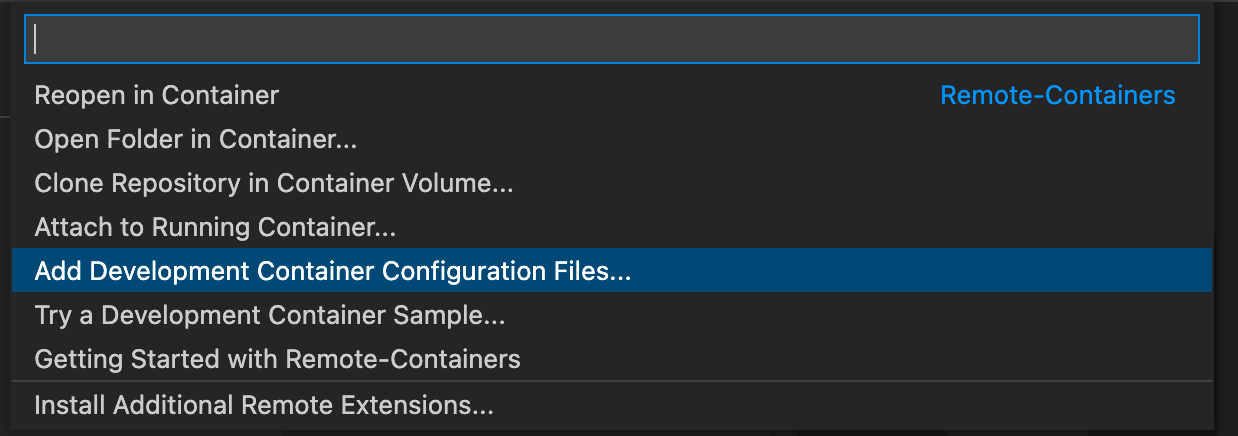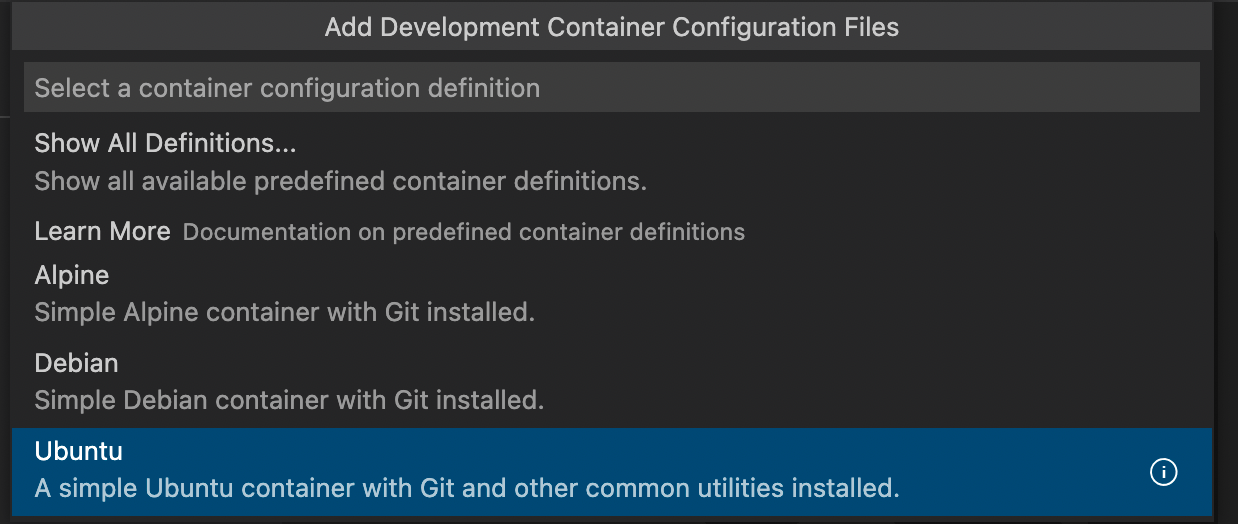RustをAWS Lambda + API Gateway環境で動かせるようにするまでのメモ
Rust初心者がSAMを使ってAWSにAPIを公開するまでやってみるメモ
環境メモ
- M1 Max Mac Book Pro 2021
- macOS Monterey 12.3.1
- VSCode 1.66
まずは、RustのRemote-Containers環境を作る。
(コンテナサイズは考慮してない)
Remote-Containersのコマンド



この時点でのdevcontainer.json
// For format details, see https://aka.ms/devcontainer.json. For config options, see the README at:
// https://github.com/microsoft/vscode-dev-containers/tree/v0.231.6/containers/ubuntu
{
"name": "Ubuntu",
"build": {
"dockerfile": "Dockerfile",
// Update 'VARIANT' to pick an Ubuntu version: hirsute, focal, bionic
// Use hirsute or bionic on local arm64/Apple Silicon.
"args": { "VARIANT": "bionic" }
},
// Set *default* container specific settings.json values on container create.
"settings": {},
// Add the IDs of extensions you want installed when the container is created.
"extensions": [],
// Use 'forwardPorts' to make a list of ports inside the container available locally.
// "forwardPorts": [],
// Use 'postCreateCommand' to run commands after the container is created.
// "postCreateCommand": "uname -a",
// Comment out to connect as root instead. More info: https://aka.ms/vscode-remote/containers/non-root.
"remoteUser": "vscode",
"features": {
"git": "latest",
"aws-cli": "latest",
"rust": "latest"
}
}
とりあえずRustを動かしてみる。
$ cargo new rust-lambda
Created binary (application) `rust-lambda` package
$ cd rust-lambda
$ cargo run
Compiling rust-lambda v0.1.0 (/workspaces/rust-aws-sam/rust-lambda)
Finished dev [unoptimized + debuginfo] target(s) in 3.93s
Running `target/debug/rust-lambda`
Hello, world!
Lambda単独で動かせるようにする。
[package]
name = "rust-lambda"
version = "0.1.0"
edition = "2021"
license = "MIT"
autobins = false
[[bin]]
name = "bootstrap"
path = "src/main.rs"
[dependencies]
lambda_runtime = "*"
serde = "*"
serde_json = "*"
serde_derive = "*"
log = "*"
simple_logger = "*"
#[macro_use]
extern crate lambda_runtime as lambda;
#[macro_use]
extern crate serde_derive;
#[macro_use]
extern crate log;
extern crate simple_logger;
use lambda::error::HandlerError;
use std::error::Error;
#[derive(Deserialize, Clone)]
struct CustomEvent {
#[serde(rename = "firstName")]
first_name: String,
}
#[derive(Serialize, Clone)]
struct CustomOutput {
message: String,
}
fn main() -> Result<(), Box<dyn Error>> {
simple_logger::init_with_level(log::Level::Info)?;
lambda!(my_handler);
Ok(())
}
fn my_handler(e: CustomEvent, c: lambda::Context) -> Result<CustomOutput, HandlerError> {
if e.first_name == "" {
error!("Empty first name in request {}", c.aws_request_id);
return Err(c.new_error("Empty first name"));
}
Ok(CustomOutput {
message: format!("Hello, {}!", e.first_name),
})
}
クロスコンパイル用の設定
$ rustup target add x86_64-unknown-linux-musl
$ brew install filosottile/musl-cross/musl-cross
トラブル発生 -> arm64向けのhomebrewがインストールできない
上記のコマンドはMac向けだったので、Ubuntuでは別の方法で回避してみる。
cargo install cross
cross build --target x86_64-unknown-linux-musl
めっちゃエラーがでた。
さらに別の方法
// This example requires the following input to succeed:
// { "command": "do something" }
use lambda_runtime::{service_fn, Error, LambdaEvent};
use serde::{Deserialize, Serialize};
/// This is also a made-up example. Requests come into the runtime as unicode
/// strings in json format, which can map to any structure that implements `serde::Deserialize`
/// The runtime pays no attention to the contents of the request payload.
#[derive(Deserialize)]
struct Request {
command: String,
}
/// This is a made-up example of what a response structure may look like.
/// There is no restriction on what it can be. The runtime requires responses
/// to be serialized into json. The runtime pays no attention
/// to the contents of the response payload.
#[derive(Serialize)]
struct Response {
req_id: String,
msg: String,
}
#[tokio::main]
async fn main() -> Result<(), Error> {
// tracing_subscriber::fmt()
// .with_max_level(tracing::Level::INFO)
// // this needs to be set to false, otherwise ANSI color codes will
// // show up in a confusing manner in CloudWatch logs.
// .with_ansi(false)
// // disabling time is handy because CloudWatch will add the ingestion time.
// .without_time()
// .init();
let func = service_fn(my_handler);
lambda_runtime::run(func).await?;
Ok(())
}
pub(crate) async fn my_handler(event: LambdaEvent<Request>) -> Result<Response, Error> {
// extract some useful info from the request
let command = event.payload.command;
// prepare the response
let resp = Response {
req_id: event.context.request_id,
msg: format!("Command {} executed.", command),
};
// return `Response` (it will be serialized to JSON automatically by the runtime)
Ok(resp)
}
[package]
name = "rust-lambda"
version = "0.1.0"
edition = "2021"
license = "MIT"
autobins = false
[[bin]]
name = "bootstrap"
path = "src/main.rs"
[dependencies]
tokio = { version = "*", features = ["macros", "io-util", "sync", "rt-multi-thread"] }
tracing = { version = "*", features = ["log"] }
lambda_runtime = "*"
serde = "*"
serde_json = "*"
serde_derive = "*"
log = "*"
simple_logger = "*"
[dev-dependencies]
tracing-subscriber = "*"
simple-error = "*"
$ cargo build --release --target x86_64-unknown-linux-musl
Compiling libc v0.2.123
Compiling cfg-if v1.0.0
Compiling proc-macro2 v1.0.37
Compiling unicode-xid v0.2.2
Compiling syn v1.0.91
error[E0463]: can't find crate for `core`
|
= note: the `x86_64-unknown-linux-musl` target may not be installed
= help: consider downloading the target with `rustup target add x86_64-unknown-linux-musl`
error[E0463]: can't find crate for `compiler_builtins`
For more information about this error, try `rustc --explain E0463`.
error: could not compile `cfg-if` due to 2 previous errors
warning: build failed, waiting for other jobs to finish...
error: build failed
うむ…
rustup target add x86_64-unknown-linux-musl
info: downloading component 'rust-std' for 'x86_64-unknown-linux-musl'
info: installing component 'rust-std' for 'x86_64-unknown-linux-musl'
39.7 MiB / 39.7 MiB (100 %) 18.9 MiB/s in 2s ETA: 0s
ライブラリのコンパイルは上手く行ったが、自分のソースコードのコンパイルでエラーがでた。
Compiling rust-lambda v0.1.0 (/workspaces/rust-aws-sam/rust-lambda)
WARN rustc_codegen_ssa::back::link Linker does not support -static-pie command line option. Retrying with -static instead.
error: linking with `cc` failed: exit status: 1
$ mkdir .cargo
$ echo '[target.x86_64-unknown-linux-musl]
> linker = "x86_64-linux-musl-gcc"' > .cargo/config
$ export RUSTFLAGS='-C linker=x86_64-linux-gnu-gcc'
$ sudo apt-get update -y
$ sudo apt-get install -y gcc-x86-64-linux-gnu
上記でとりあえずコンパイルはできた。
RUSTFLAGSを設定しなくても、.cargo/configの設定でもいける。
linker = "x86_64-linux-gnu-gcc"
いったんビルドまでのまとめ
$ rustup target add x86_64-unknown-linux-musl
$ sudo apt-get update -y
$ sudo apt-get install -y gcc-x86-64-linux-gnu
$ mkdir .cargo
$ echo '[target.x86_64-unknown-linux-musl]
> linker = "x86_64-linux-gnu-gcc"' > .cargo/config
cargo build --release --target x86_64-unknown-linux-musl
デプロイ用にzipを作る
$ zip -j rust.zip ./target/x86_64-unknown-linux-musl/release/bootstrap
とりあえず、手抜きでコンソールからzipをアップロードして動作確認したら動いた!
{ "command": "do something" }
{
"req_id": "492366fe-7ae4-4fbc-8d79-527872b87496",
"msg": "Command do something executed."
}
ってか、久しぶりにLambdaを見たらarm64にも対応してるんじゃね? x86_64より安価で高速ならarm64を選ぶよね?
arm64を試す。
[target.aarch64-unknown-linux-gnu]
rustflags = [
"-C", "target-cpu=neoverse-n1",
]
[target.x86_64-unknown-linux-musl]
linker = "x86_64-linux-gnu-gcc"
cargo build --release --target aarch64-unknown-linux-gnu
zip -j rust_arm64.zip ./target/aarch64-unknown-linux-gnu/release/bootstrap
arm64でも普通に動いたw
awscliを使いやすくするために.devcontainerでdocker-composeを使うように変更。
// For format details, see https://aka.ms/devcontainer.json. For config options, see the README at:
// https://github.com/microsoft/vscode-dev-containers/tree/v0.231.6/containers/ubuntu
{
"name": "Ubuntu",
// Update the 'dockerComposeFile' list if you have more compose files or use different names.
// The .devcontainer/docker-compose.yml file contains any overrides you need/want to make.
"dockerComposeFile": [
"docker-compose.yml"
],
// The 'service' property is the name of the service for the container that VS Code should
// use. Update this value and .devcontainer/docker-compose.yml to the real service name.
"service": "rust",
// The optional 'workspaceFolder' property is the path VS Code should open by default when
// connected. This is typically a file mount in .devcontainer/docker-compose.yml
"workspaceFolder": "/workspace",
// "build": {
// "dockerfile": "Dockerfile",
// // Update 'VARIANT' to pick an Ubuntu version: hirsute, focal, bionic
// // Use hirsute or bionic on local arm64/Apple Silicon.
// "args": { "VARIANT": "bionic" }
// },
// Set *default* container specific settings.json values on container create.
"settings": {},
// Add the IDs of extensions you want installed when the container is created.
"extensions": [],
// Use 'forwardPorts' to make a list of ports inside the container available locally.
// "forwardPorts": [],
// Use 'postCreateCommand' to run commands after the container is created.
// "postCreateCommand": "uname -a",
// Comment out to connect as root instead. More info: https://aka.ms/vscode-remote/containers/non-root.
"remoteUser": "vscode",
"features": {}
}
version: "3"
services:
rust:
build:
context: ./
dockerfile: Dockerfile
args:
- VARIANT=hirsute
working_dir: /workspace
volumes:
- ~/.aws:/home/vscode/.aws
- ~/.ssh:/home/vscode/.ssh
- ../:/workspace:delegated
# environment:
# - HOGE=value
# Overrides default command so things don't shut down after the process ends.
command: /bin/sh -c "while sleep 1000; do :; done"
ホスト環境の.awsと.sshをそのまま使う。
Dockerfileでawcliやらrustの実行に必要なコンポーネントをインストールできるように変更。
# See here for image contents: https://github.com/microsoft/vscode-dev-containers/tree/v0.231.6/containers/ubuntu/.devcontainer/base.Dockerfile
ARG VARIANT
FROM mcr.microsoft.com/vscode/devcontainers/base:0-${VARIANT}
RUN apt-get update \
&& apt-get -y install --no-install-recommends \
gcc \
build-essential \
python3 python3-pip \
git \
gcc-x86-64-linux-gnu \
&& apt-get -y clean \
&& rm -rf /var/lib/apt/lists/*
# aws-cli v2
RUN curl "https://awscli.amazonaws.com/awscli-exe-linux-aarch64.zip" -o "awscliv2.zip"
RUN unzip awscliv2.zip
RUN ./aws/install
# aws-sam-cli
RUN pip3 install --upgrade aws-sam-cli
USER vscode
# Rust
RUN curl https://sh.rustup.rs -sSf | bash -s -- -y
ENV PATH $PATH:/home/vscode/.cargo/bin
RUN rustup target add x86_64-unknown-linux-musl
Rustのインストールは実行ユーザーをvscodeにしないと上手く動かなかった。
デフォルトだと/root配下に入るのでアクセスできない。
(他にもよい方法があるかもしれん)
samで色々ハマる。
arm64で動かしたかったので最初に設定したのはこれ。
RustTestFunction:
Type: AWS::Serverless::Function # More info about Function Resource: https://github.com/awslabs/serverless-application-model/blob/master/versions/2016-10-31.md#awsserverlessfunction
Properties:
FunctionName: RustTestArm64
Architectures: [ arm64 ]
Handler: main
Runtime: provided
CodeUri: .
Events:
〜省略〜
Metadata:
BuildMethod: makefile
これで動かすとsam deploy時に失敗する。
"Runtime provided does not support the following architectures [arm64].
arm64の場合、Runtimeを以下のように設定しないといけないらしい。
Runtime: provided.al2
Makefileでもハマる。
Error: CustomMakeBuilder:MakeBuild - Make Failed: /workspace/Makefile:2: *** missing separator. Stop.
知ってる人なら常識なのだろうが、Makefileのコマンド部分はタブで区切らないとダメなそうな
build-RustTestFunction:
cargo build --release --target aarch64-unknown-linux-gnu
cp ./target/aarch64-unknown-linux-gnu/release/bootstrap $(ARTIFACTS_DIR)
うーん、bionicでbuildした奴なら動くけど、hirsuteだとダメっぽいな。
START RequestId: 5e65578e-5e14-4a98-a5d7-0746bd0f6c92 Version: $LATEST
/var/task/bootstrap: /lib64/libc.so.6: version `GLIBC_2.28' not found (required by /var/task/bootstrap)
/var/task/bootstrap: /lib64/libc.so.6: version `GLIBC_2.33' not found (required by /var/task/bootstrap)
/var/task/bootstrap: /lib64/libc.so.6: version `GLIBC_2.32' not found (required by /var/task/bootstrap)
/var/task/bootstrap: /lib64/libc.so.6: version `GLIBC_2.28' not found (required by /var/task/bootstrap)
/var/task/bootstrap: /lib64/libc.so.6: version `GLIBC_2.33' not found (required by /var/task/bootstrap)
/var/task/bootstrap: /lib64/libc.so.6: version `GLIBC_2.32' not found (required by /var/task/bootstrap)
END RequestId: 5e65578e-5e14-4a98-a5d7-0746bd0f6c92
色々と謎だな…
No space left on device に遭遇する。
$ df
Filesystem 1K-blocks Used Available Use% Mounted on
overlay 61255492 58724724 0 100% /
tmpfs 65536 0 65536 0% /dev
shm 65536 0 65536 0% /dev/shm
/dev/vda1 61255492 58724724 0 100% /vscode
grpcfuse 971350180 536842192 434507988 56% /workspace
tmpfs 4070996 0 4070996 0% /sys/firmware
100%になったのはわかったが、対処方法がわからんのでDockerイメージを削除して再作成で対処。
bionicの場合、pythonが古くてsamのインストールでコケたのでpython3.9を入れる。
$ sudo apt update
$ sudo apt install build-essential libbz2-dev libdb-dev \
> libreadline-dev libffi-dev libgdbm-dev liblzma-dev \
> libncursesw5-dev libsqlite3-dev libssl-dev \
> zlib1g-dev uuid-dev tk-dev
$ wget https://www.python.org/ftp/python/3.9.12/Python-3.9.12.tar.xz
$ tar xJf Python-3.9.12.tar.xz
$ cd Python-3.9.12/
$ ./configure
$ make
$ sudo make install